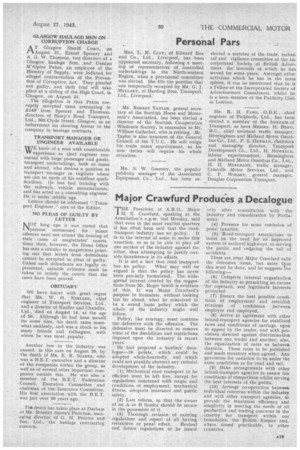Major Crawfurd Produces a Decalogue
Page 21

If you've noticed an error in this article please click here to report it so we can fix it.
THE President of A.R.O., Major H. E. Crawfurd, speaking at the Association's a.g.m. last Monday, said that even in the most exalted quarters it has often been said that the road
transport industry has no policy. It -is to the interest of some to make this assertion, so as to be able to play off one section of the industry against the other, thus attempting to justify outside interference in its affairs.
It is not a fact that road transport
has no policy. What may well be argued is that the policy has never been precisely formulated, The widespread interest created by the suggestions from Mr. Roger Sewill is evidence of this: It' was Major Crawfurd's purpose to formulate, without looking to far ahead, what he conceived to be a sound basic policy which the whole of the industry might well follow_
Policy, like strategy, must combine. the defensive with the offensive. The defensive roust be directed to remove some of the disabilities and restrictions imposed upon the industry in recent years.
He had prepared a hauliers' decalogue-10 points, which could be adopted whole-heartedly, and which could not possibly obstruct any rational development of the industry, (1) Mechanical road transport to be efficient must be left free, except for regulations concerned with wages and conditions of employment, mechanical fitness, adequate insurance and public safety.
(2). Law, reform, so that the owner of an A or B licence should be secure in the possession of it.
(3) Thorough revision, of existing regulations and repeal of all having restrictive or penal effect. Revised and future regulations to be issued only after consultation with the industry and consideration by Parliament.
(4) Pressure for some remission of penal taxation.
(5), Road-transport associations to insist on the need' for an improved system of national highways, so serving the public and reclining the toll of accidents.
These are what Major Crawfurd calls the defensive items, but more than this must be done, and he suggests he following:—
(6) Complete internal organization of the industry so permitting no excuse for reproach, and legitimate interests protected.
(7) Ensure the best possible conditions Of employment and establish relations of confidence between employer and employed.
(8) Arrive at agreement with other inland-transport agencies for stabilized rates and conditions of carriage, open to appeal by the trader, and with provisions directed against discrimination between one, trader and another; also, the equalization of rates as between districts, These rates to be published and made statutory when agreed. Any provisions for variation to be under the same conditions as for road and rail.
(9) 1Make arrangements with other inland-transport agencies to ensure fair conditions of competition whilst serving the best interests of the public.
(10) Arrange co-operation between individual concerns within the industry and with other transport agencies, to provide the maximum efficiency and simplicity in meeting the needs of all productive and trading concerns in the country for transport within our boundaries, the' British Empire and, where found pfacticable, to other countries.




















































